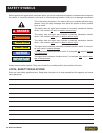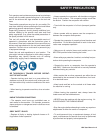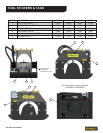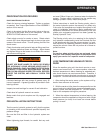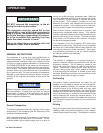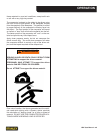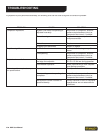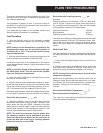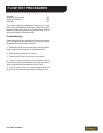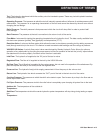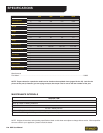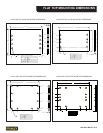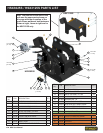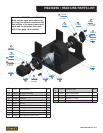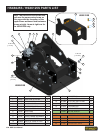
HSX User Manual ◄ 11
FLOW TEST PROCEDURES
The correct performance of this procedure will verify if the
auxiliary circuit of the carrier is adequate to properly oper-
ate a Stanley attachment.
This procedure is generic in form. It is the end users re-
sponsibility to ensure that this procedure will work with his
specic type of equipment.
If an adequate ow meter is not available contact your
Stanley Hydraulic Distributor for assistance.
Test Procedure
1. With the auxiliary circuit (or kit) completely installed
connect the ow meter between the tool inlet and outlet
hoses.
NOTE: Always use the hoses that are supplied for the
attachment and make sure the machine hydraulic oil
is between 90° to 120° F. This will assure correct read-
ings and adjustments.
2. With the machine setting at the mode that’s going to be
used to operate the attachment record the GPM _____.
Locate the correct ow for the attachment in the manual
under the specication section. Adjust the machine to the
correct GPM.
NOTE: If possible, always set the machine to the high-
est GPM output mode. This will prevent the operator
from over owing the attachments.
3. Once the correct GPM ow is achieved fully open the
restrictor on the ow meter.
4. With the machine in the attachment mode set in step 2
record the back-pressure. At this point the pressure read-
ing on the pressure gauge is the back-pressure in the cir-
cuit. This pressure must not exceed 200 psi/13.5 bar.
Excessive back-pressure will slow the attachments opera-
tion and lead to premature seal failures and over heating.
Record the back-pressure ______ psi.
5. Close the restrictor valve on the ow meter until the
attachment relief starts to crack or open. The relief valve
opens when the ow rate (GPM), indicated on the ow
meter begins to decline rapidly. Locate the tools operating
system relief pressure in the specication section in the
manual. Adjust attachment relief to specication.
NOTE: The relief valve pressure must be greater than
the operating pressure of the attachment and three
times the back-pressure. Never use the relief valve to
control the ow rate in the circuit. Cracking pressure
means the loss of 4 or more GPM.
Record the relief cracking pressure _____ psi.
Example:
Operation pressure of a breaker is 2700 psi. Back-pres-
sure is 150 psi. A good rule to follow when setting the re-
lief, multiply the back pressure by 3 then add this number
to the operation pressure of the attachment.
Operating Pressure 2700 psi
Back-pressure 450 psi
Operating pressure of the tool 3150 psi
The relief valve setting must be greater than the estimated
operating pressure of the tool. If the setting is lower, dam-
age to the circuit may occur. Excess heat will be gener-
ated in the circuit which will damage the attachment and
carrier.
Heat Load Test
With the installation kit properly installed and adjusted per
the above procedure, conduct the head load test as fol-
lows.
1. Connect the ow meter between the tool inlet and out-
let hoses.
2. With the carrier set in the attachment mode, restrict the
ow meter until a pressure of 1000 psi is achieved. This
pressure must be maintained throughout the heat test.
NOTE: Closing of the restrictor may be required as the
temperature increases.
Monitor the oil temperature from the ow meter until no
change is noted. Record the time required for oil to stabi-
lize. Record the surrounding temperature (ambient tem-
perature). Record the time required to stabilize ______
minutes.
Record the stabilized oil temperature ______F.
Record the ambient temperature ______ F.
The “heat rise” is calculated as the stabilized temperature
minus the ambient temperature.




